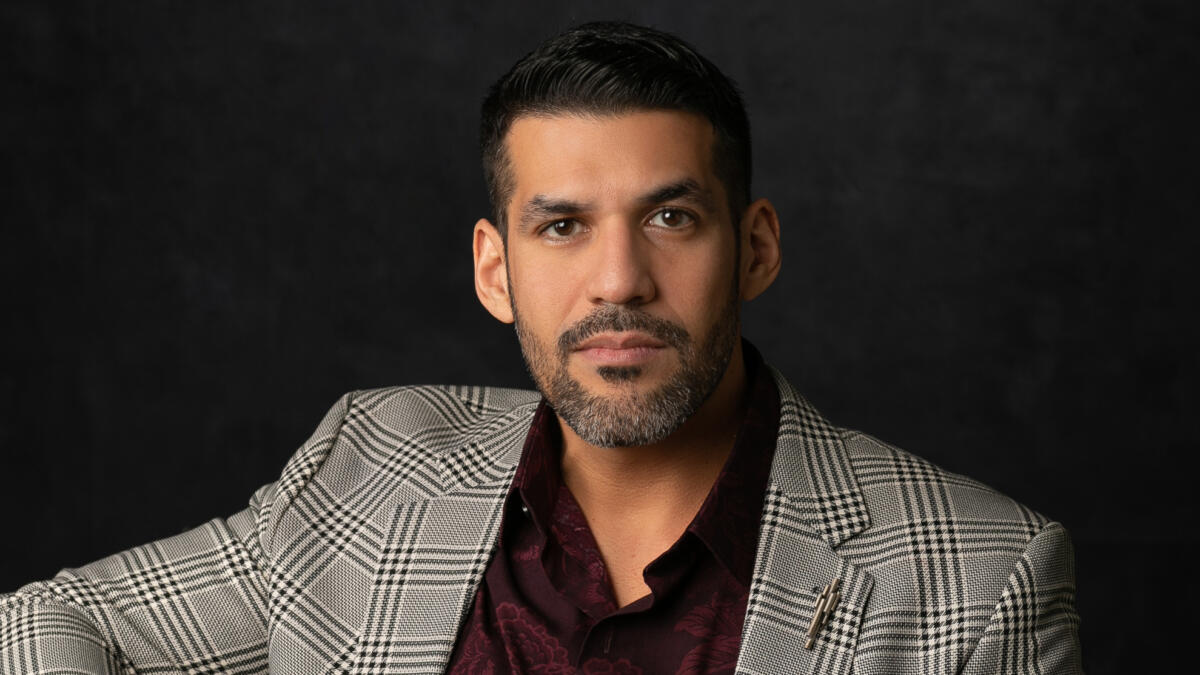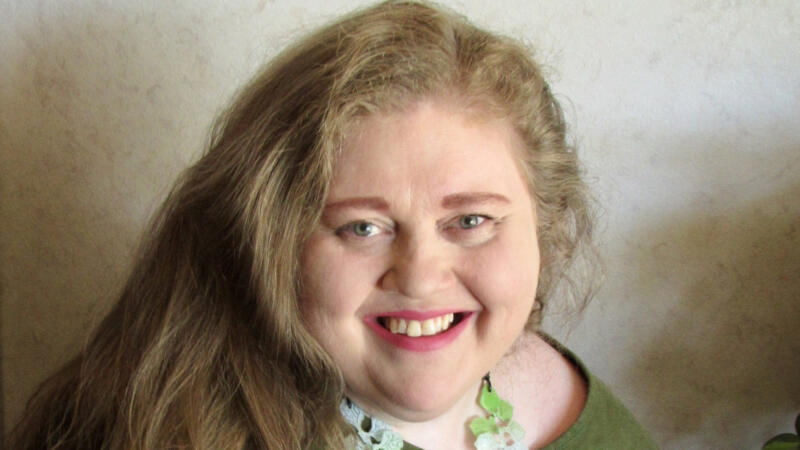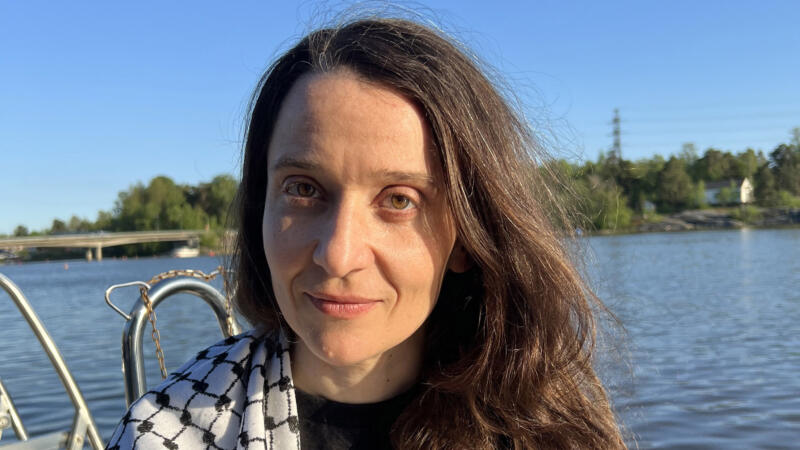Alum of the Year Jimmy López: “The Sibelius Academy gave me some of the most formative years of my life”
Peruvian Jimmy López is considered one of the most interesting composers of his generation, and he has a special bond with Finland. López is one of Uniarts Helsinki’s Alumni of the Year 2025.

A bodybuilder. That is one alternative career path that Jimmy López could have taken if he was not a composer.
“I like the discipline of it – five to six meals a day, a workout at the gym, rest. It resembles composing in a way because that, too, requires a goal-oriented and dedicated approach,” López says.
These days, he doesn’t mind toying with the idea of a different line of work, but that didn’t used to be the case.
López hadn’t had any formal classical music training by the age of 16 when he informed his parents that he would apply to the National Conservatory of Peru after finishing high school.
“I didn’t have a plan B, and I didn’t want one. Pursuing composing was the only option.”
Blown away by Bach
Five-year-old López had been such a menace during his big sister’s piano lessons that his mother bought him a small keyboard and signed him up for lessons, as well.
“Piano was a fun way to spend time, but I wasn’t really serious about playing,” López reminisces.
Traditional sheet music was not part of the teaching method, and López did not hear much classical music. He only heard snippets of it in comedic contexts like chase scenes in cartoons.
But one day at school, his music teacher sat down by the piano and started playing Invention No. 13 in A minor by Bach.
“I was maybe 12 years old, and obviously I didn’t understand what I was hearing, but it blew me away. Later I learned that it was counterpoint, the technique of combining two independent melodic lines in perfect harmony,” López says.
Arriving home from school, the young boy’s head was racing with thoughts. Who was this Bach who composed such thrilling music? Was there more of that? How did people write that?
López began to study the field independently. He was persistent in his efforts and learned to read sheet music, spent his evenings reading his music theory books and could spend half an hour analysing a single bar.
“It definitely wasn’t easy. But the more I learned, the more I wanted to know even more.”
An identity crisis and new roots in Finland
Usually, people who applied to the conservatory had started their classical music studies already at an early age. López decided to apply even though he knew he had some catching up to do. He needed to keep working hard.
“I took private lessons, I worked at a music library, I studied day after day,” he says.
Thankfully, his dedication was rewarded and he got in. What opened up to him was not only the doors to a conservatory but to a whole new world among young people who listened to the same music as him.
“People found me maybe a bit weird in my previous school years. But in this new group at the conservatory, I got a strong sense of belonging.”
López admired European composers and wanted to continue his studies abroad after graduation. He was interested in Germany and France, but the language turned out to be an issue.
He could have got by with English in the United States and Great Britain, but the cost of education was considerably high in both countries.
When a music critic who was a friend of López told him about Finland, he took an interest in this place where not only you could pursue studies in English but where composers were also held in high regard and contemporary classical music was thriving.
“I listened to Einojuhani Rautavaara, Aulis Sallinen, Kalevi Aho and Magnus Lindberg and was dumbfounded. Finland sounded like a country of modern masterpieces,” López says.
López enrolled as a student at the Sibelius Academy in 2000. He finds that the following seven years of studies had a strong influence both on his artistic identity and relationship with his personal cultural heritage.
“When I was still living in Peru, I only admired European composers. In Finland, I had a kind of identity crisis that made me think of my roots in a new way. It led to me to incorporate Peruvian sounds in my music,” he says.
Fiesta! and an international breakthrough
Finland was also a time of liberation for López. Here, López had room to grow as a person and as an artist, discover his sexual identity and build his life on his own.
“They were actually some of the most formative years of my youth,” he says.
López earned his international breakthrough with Fiesta! (2007), which he originally composed as a commissioned piece for a chamber orchestra. It was conductor Miguel Harth-‑Bedoya who had commissioned the work, and after he arranged it for the orchestra, the piece started creating buzz in different parts of the world quite quickly.
The piece is colourful and full of surprises. It can be described as a cocktail of Baroque dances, modern club culture rhythms, Peruvian folk music and Afro-Latin aesthetics.
“I wanted the piece to be like an innovative culinary dish that blends different ingredients,” he says.
Fiesta! has received over 100 performances worldwide, which is a major achievement for a composer of the 2000s.
Another major milestone was the opera Bel Canto (2015), which was commissioned by the Lyric Opera of Chicago, helping him gain visibility especially in the United States.
“This piece probably made the biggest mark on my career. If it wasn’t for that, I might have needed to pursue academia for work. Bel Canto gave me the chance to focus on being a full-time composer.”
Art on a human level
López has had a successful career as a composer. His track record includes first prizes won in international composition competitions, major commissioned works and accolades such as a Latin Grammy nomination in 2022.
He is a disciplined composer, and his working days are carefully planned out. He always starts his mornings by going to the gym, and after that, it is time for lunch and a moment of rest.
“I start my actual composing work in the afternoon and continue with that until the evening or even late night. I don’t always get a lot done, but it’s important to have routines. If you’re just waiting for inspiration to strike you without doing anything, you can’t create anything.”
López has studied in several countries and values high-quality arts education.
Something that he sees as a flaw in the system is that institutions should make students more prepared for the reality that awaits them in the arts sector.
“Many of my gifted classmates never really got their careers going because they lacked the skills to sell their talent,” he notes.
In fact, it is integral that up-and-coming artists know how to price their work, build networks and apply for funding for their work.
An award with a deeper meaning
López shares that being selected as the Alum of the Year by Uniarts Helsinki’s Sibelius Academy means a lot to him.
“When I look back and reminisce who I was as a 21-year-old coming to Finland, it feels almost incredible being here today,” he says.
The award has a special meaning to him also because Finland and studying here have been such a vital part of his life and artistry.
“I hope to inspire other people outside of Finland to apply to Uniarts Helsinki. It’s a place where you can truly grow into an artist of the highest global standard.”
Text: Elli Collan
Jimmy López, b. 1978
- Studied at the Sibelius Academy and graduated as a Master of Music in 2007
- Completed a doctoral degree in composition at the University of California in Berkeley in 2012
- His works have been performed by such orchestras as the Chicago Symphony Orchestra, Royal Concertgebouw, Orchestre de Paris and Philadelphia Orchestra
- Lives in California
The title of Alum of the Year is awarded each year to select alumni from Uniarts Helsinki’s three academies who have highlighted the unique value and role of art and artist education in an exemplary manner through their work.

